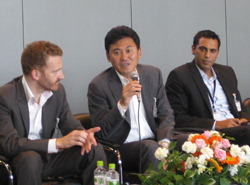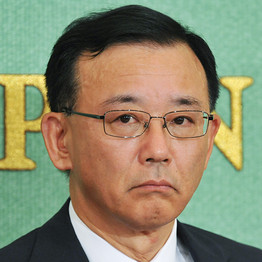23:18
Last post of the night:
We have Adachi-ku results.
With 20% reporting, Renho was the big winner with 20,000 votes, followed by Komeito candidate Toshiko Takeya with 12,000. Hmm… I will update later on in the week with detailed results.
Good night everyone! Next to watch will be how DPJ cobbles together votes to pass bills in the upper house.
23:01
Tokyo has 5 seats up for election, and four so far have been effectively settled (including Renho who won). Now there is a tight battle shaping up for the fifth seat between Akira Koike, a leader of the Communists, and Kota Matsuda, the head of Tully’s chain of coffee shops running under Your Party. Koike is up at the moment.
22:59
Takenaka’s point for dealing with the consumption tax was to do thorough spending cuts first, then ask the public to accept higher taxes. Unpopular cuts will probably be almost as politically difficult as raising the tax, so this doesn’t strike me as particularly realistic.
22:55
TV Asahi officially called the overall result – DPJ/PNP coalition loses majority in upper house.
22:46
Just had a thought. Ryoko Tani the judo player will be an upper house member for six years. That’s at least one championship and one olympics. Basically her athletic career is over for a completely worthless life as a PR upper house member. Ozawa must be a silver-tongued charmer.
22:33
Heizo Takenaka on TV Tokyo looking smug. He is in full “told ya so” mode on Kan’s decision to bring up the consumption tax.
22:20
Two former Koizumi children who lost their seats last year are back in the Diet, now upper house members – former finance bureaucrat Satsuki Katayama and former financial economist Yukari Sato. Let the pointless drama begin.
22:17
Adachi-ku has broken out some of its election results.
56% turnout for election district voting and PR
My district in Ayase: 53% (4879 of 9208 voters)
And, that’s it for now…
22:01
Multiple estimates have the Communists losing seats. They seem less relevant by the day…
21:34
One of the interesting candidates in this election is Kenta Wakabayashi, running in Nagano. He is the son of Masatoshi Wakabayashi, who had to quit in April after getting caught voting for another member.
Early results have him ahead, so we will have a successful transfer of power from father to son. Great.
21:20
Reuters is out with reports on the exit polls.
Meanwhile, I’ve been asked what I think the likely result would mean for postal reform. While it really depends on a lot, there are two likely scenarios given that the DPJ and PNP together cannot form a majority:
1) a divided Diet, where the governing coalition does not control the body, or
2) a coalition with other parties, which may end up marginalizing the PNP (which is the main backer of the postal legislation)
In either case, the prospects for the government to pass the bills that were submitted in the last Diet session would be reduced dramatically.
21:17
Your Party leader Watanabe is being interviewed now. He is definitely softening his tone on a potential coalition with DPJ, now that he is in a position of strength. He did not exactly hedge about actually forming one (he defiantly denied any possibility before), but he did start talking about “areas where we can work together” such as ministry reform.
21:13
The announcer on TV Asahi just made the point that without an upper house majority, opposition members will have to control at least one committee in the upper house. That would only contribute to the paralysis of a divided diet.
20:10
Asahi is projecting Social Democrat leader Mizuho Fukushima will win reelection in the PR category. Overall, they may gain 2 seats to bring their presence in the upper house to 5. So it looks like we haven’t seen the last of her daily comments on NHK news and regular debate show appearances.
20:58
TV Asahi seems to be calling these races with just 1-2% of the vote counted so far… Maybe wait a little longer? In terms of called races, they are giving DPJ 35 seats vs. LDP 31. With 41 seats left things can still turn either way. Oh, and so far Your Party has 5.
20:43
TV Asahi has Your Party winning 9 seats, bringing their numbers to 10 from just one. Their importance just rose in that proportion…
20:32
Two major wins for the DPJ reported on TV – Renho won reelection, and judo star Ryoko Tani won her proportional representation seat.
20:24
One theme I am watching in this election is whether the Happiness Realization Party, with its first Upper House member and new election strategist, can learn from past mistakes and improve performance this time around.
During the last two elections (Tokyo municipal and Lower House), the party ran candidates in every single district, only to fail miserably. This time, the website shows a more modest attempt – five candidates for proportional representation (including the insane Dr. Nakamats) and 19 in prefectural districts.
20:15
Just noticing that Observing Japan’s latest post is dismissing questioning the potential for an unbowed Ozawa to be a thorn in Kan’s side after the election. A lot depends on tonight’s results, but there’s a chance Ozawa could take his ball and go home if it comes down to it – meaning he could try and engineer a split of the DPJ if he feels too slighted in some way, say through a crushing defeat of his favored candidate in September’s presidential election.
20:10
Asahi is tweeting that according to its exit polls, the DPJ is estimated to win just 43-51 seats, leaving the ruling coalition likely without a majority.

The polls have just closed and it is time to watch the results! I will be intermittently checking in with news/observations. Updates will pop up on top, so keep refreshing the mutantfrog.com top page (or this entry) for updates.



